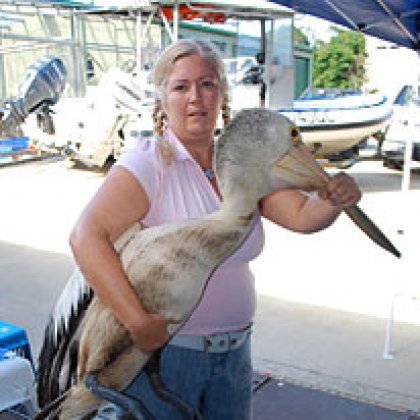
Staff at UQ’s Moreton Bay Research Station are ready to treat any wildlife affected by Wednesday’s oil spill, with the station’s boatshed able to be converted into an animal triage centre if required.
As a trained oiled wildlife supervisor, Station Manager Dr Kathy Townsend is liaising closely with the Environmental Protection Agency and community volunteers.
“At this stage we’re still on alert and are receiving constant updates from the EPA,” Dr Townsend said.
“I’ve also been in touch with some of our contacts in the community, and we have a few vets and wildlife carers on standby.”
A team of station staff is regularly monitoring the beach for injured animals, keeping a close watch for seven lightly oiled pelicans spotted on Moreton Island.
“The pelicans were found on Moreton Island, where the situation is worse, but I’ve actually seen them here at Dunwich before so we’re keeping an eye out for them,” Dr Townsend said.
“The longer that slick is out there, the higher the risk to wildlife.”
Former director of UQ’s National Research Centre for Environmental Toxicology, Emeritus Professor Michael Moore, is predicting that the oil will quickly move into Moreton Bay, making Dr Townsend’s temporary animal hospital crucial.
“When you look at the pictures of the spill, it seems obvious that it will move into the bay, particularly if the weather becomes wilder,” Professor Moore said.
While sea birds will likely be the most emotive oil spill casualties, Professor Moore said other environmental impacts should not be disregarded.
“The oil can obviously be potentially toxic to birds, particularly if sea birds like pelicans get their feathers oiled,” he said.
“It’s important not to neglect other, perhaps less charismatic animals, like pippies washed up on the beach.
“You also have to think about the impact of destroying the oil that is dredged up – one option is to burn it but that immediately creates a very large carbon emission."
Professor Moore said while the containers of ammonium nitrate dropped into the sea could cause algal growth and were potentially toxic to fish, the oil spill posed a greater immediate environmental risk.
Media: Dr Townsend, Centre for Marine Studies (07 3409 9058, 0438 307 309), Professor Moore (0404 878 111, m.moore@uq.edu.au) or Penny Robinson at UQ Communications (07 3365 9723, penny.robinson@uq.edu.au)
.jpg)

